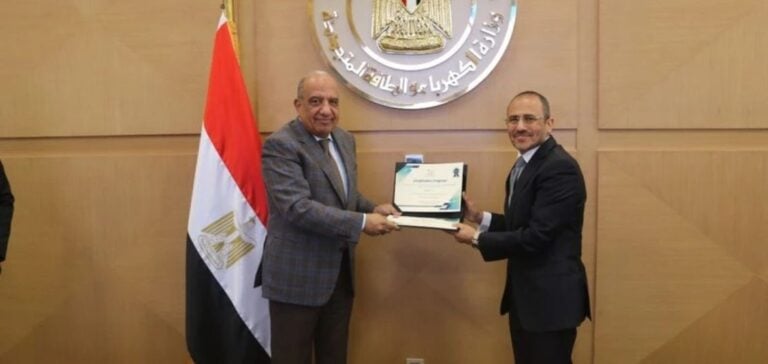Egypt has issued qualification certificates to four private renewable electricity producers to supply 400 MW directly to local industrial companies. This initiative, implemented without public guarantees, is part of a mechanism aimed at encouraging private sector participation in the national electricity system.
USD388mn projects led by regional players
The producers Neptune, AMEA Power, Taqa PV and Enara Energy Services will develop these projects with a combined investment of USD388mn. The electricity generated will be delivered to several major industrial clients, including El Sewedy Steel, Ezz Steel, Helwan Fertilizers, Befar Group, Alamein Silicon Products and AP Moller (Canal de Suez Containers). The installations will consist of solar and hybrid plants combining solar and wind power.
The certificates were officially presented on 28 May in the presence of Minister of Electricity Mahmoud Esmat. The projects fall under the “Private to Private” (P2P) framework, a regulatory system that enables private producers to sell electricity directly to businesses through the public grid, subject to a transit fee.
A partially liberalised electricity market
The mechanism aims to partially liberalise the electricity market by reducing the financial burden on the state while attracting private investment. Industrial companies thereby gain direct access to low-carbon energy at competitive prices, in a global context increasingly influenced by environmental requirements across supply chains.
In the same session, the Minister of Electricity presented a report to the Council of Ministers indicating that installed and developing renewable capacity in the country now totals 25,146 MW. This figure exceeds the original target of 21,000 MW set for 2030. The report highlights major projects such as the Aswan High Dam (2,100 MW), the Benban solar plant (1,465 MW) and the wind farms in Zaafarana and Ras Ghareb.
A national strategy focused on export
Egypt affirms its ambition to become a regional and international supplier of low-emission electricity, supported by a growing influx of foreign funding and an expanding energy infrastructure. The government continues to integrate the private sector into this strategy, prioritising source diversification and grid stability.
“Integrating the private sector into energy development is essential to maintain our industrial momentum and meet market demands,” said Mahmoud Esmat during the accreditation ceremony, according to Agence Ecofin on 31 May.






















